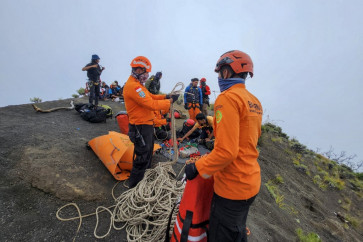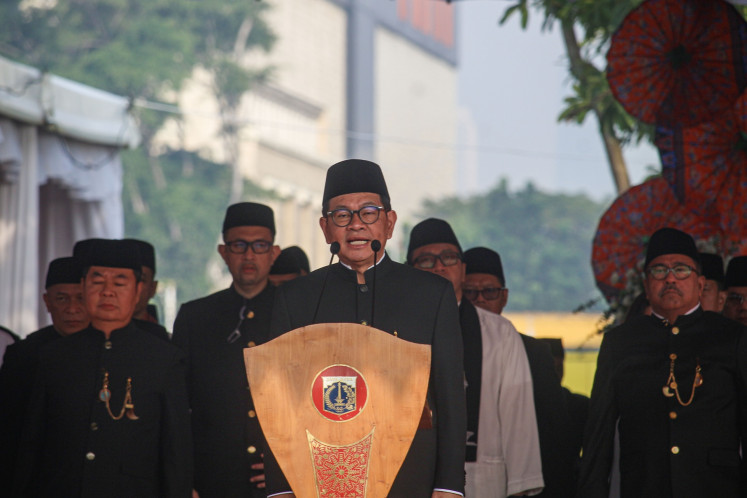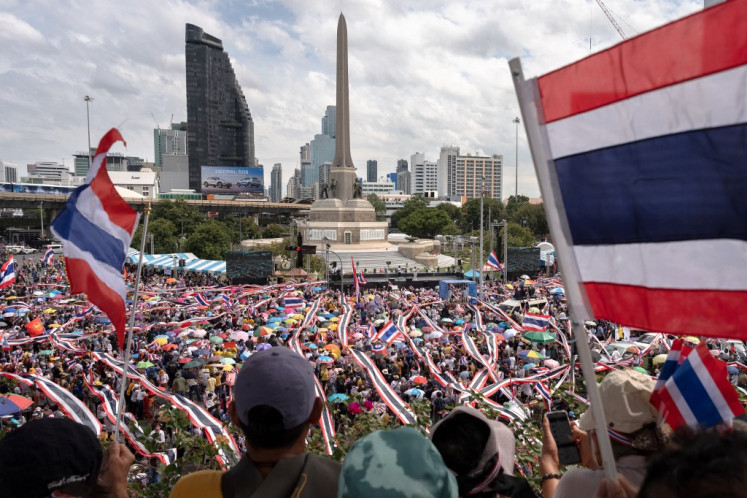Popular Reads
Top Results
Can't find what you're looking for?
View all search resultsPopular Reads
Top Results
Can't find what you're looking for?
View all search resultsWona Sumantri: Promoting Indonesia in the US through pencak silat
(JP/Novia D
Change text size
Gift Premium Articles
to Anyone
 (JP/Novia D. Rulistia) (JP/Novia D. Rulistia)
(JP/Novia D. Rulistia) (JP/Novia D. Rulistia)
(JP/Novia D. Rulistia)
Having lived in the US most of his life, Jakarta-born Wona Sumantri embraced Indonesian culture through pencak silat, a traditional form of martial arts.
And now, the pencak silat instructor wants to teach more people in the US about it as a gateway to learning about Indonesia.
'I have been living in the US since I was five and I didn't know much about the country I was born in. But through pencak silat, I now feel like I've gotten to know Indonesia better,' he said during the recent Congress Indonesian Diaspora in Jakarta.
His interest in pencak silat was sparked when he saw his father practicing Cimande-style silat, a style which is believed to have originated in West Java, at home every morning.
But Cimande-style bored young Wona, because as a kid, he yearned to take part in activities that involved dynamic movements.
'And then I found out that the Indonesian Embassy in Washington offered a pencak silat class. I enrolled in the course and I also signed-up at Al-Azhar pencak silat school in Maryland, Washington, which is currently still active,' Wona said.
The 37-year-old said that it was pencak silat's movements that made it more special to him than other forms of martial arts.
'It's unique; the stance where we sit down or stand up still allows us to counter attack opponents. And it's very receptive, every movement must have its own purpose,' Wona said.
After eight years in the US, he made a trip back to Indonesia at 13-years-old. He used his time in Indonesia to learn more about pencak silat. He took courses at Al-Azhar in Indonesia and met his father's martial art teacher, Rifai Sahid, who became Wona's private instructor, teaching him about different forms of pencak silat and its history. The more he learns about pencak silat, the deeper he falls in love with it.
'I should also say that different variations of pencak silat, like silat harimau (tiger-style), makes me interested in it even more,' Wona said.
It was not difficult for Wona to pass a series of tests that were required to progress to higher levels. At just 16-years-old, Wona successfully reached the instructor level and began teaching pencak silat two years later at the Indonesian Embassy. However, becoming an instructor was just the beginning of his long journey in mastering different aspects of the traditional form of martial arts.
'We can't stop learning even if we become an instructor'that's actually just the start. I knew that I was nothing, so I had to keep learning,' Wona said.
Wona is currently the head instructor at Al-Azhar pencak silat school, at the Indonesian Embassy and is an adjunct pencak silat professor at American University in Washington DC.
He currently has 100 students at Al-Azhar, mostly Americans who actively take part in many cultural events in the US.
'I teach my students, both at Al-Azhar and at the university, not only about pencak silat and its history, but also about Indonesia itself. I want them to know about Indonesia, too,' Wona said.
He said that one of his students at the university was so interested in Indonesia after taking his course that she earned a scholarship from the Indonesian government to learn about Indonesian culture for three months in Indonesia.
'Many Americans become interested in Indonesia after learning a little bit about the country. Now I realize that pencak silat is also a tool to promote Indonesia's diverse cultures and tourism,' Wona said.
After teaching at Al-Azhar and the embassy for years, Wona finally decided to open up his own pencak silat school in 2010, naming it Silat Martial Arts Academy in Maryland.
He said that he decided to make it commercial because he wanted to give people an alternative place to study pencak silat that had more flexible hours and offered a variety of courses, including private lessons, bladed weapons training and defense and martial arts for kids. However, it is not easy living in the US relying solely on work as an instructor. In between teaching his pencak silat courses, Wona also works as an IT consultant.
'I've always loved IT, and the money is good. To be realistic, it would be hard to get by just as a pencak silat instructor,' the holder of a Master's Degree in IT from Maryland University said. Nevertheless, Wona's passion for pencak silat should never be questioned. He is currently working on creating a non-profit association that unites all pencak silat groups in the US.
'There are a lot of pencak silat groups in the US, but we don't work together. If we have an association, we can tell people that it's part of something bigger, that it does not only have one style,' he said.
When that goal has been materialized, Wona said was already setting is mind on another target: returning home and seeing the beauty of the archipelago.
'I don't have the opportunity to explore my own country because I've been away since I was small. So when I make my return, I want to travel across Sumatra, Kalimantan, Sulawesi and Papua. Soon, hopefully,' said Wona.









